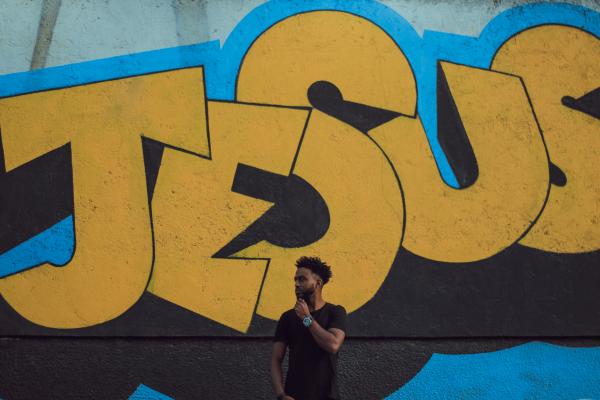Following the January 6 attack on the U.S. Capitol, Gina Ciliberto and Stephanie Russell-Kraft reported for sojo.net that Christian symbolism was ubiquitous on the Hill. “Jesus Saves,” read signs. “Jesus is my Savior,” shouted protesters. Two males wore sweatshirts proclaiming, “You Need Jesus.”
I have known Jesus saves for as long as I can remember, born into the Southern Baptist tradition in rural Missouri. I have identified with evangelical Christianity for just as long. But as I watched the events unfold that day, I did not recognize the voices claiming the faith I know and love. I was embarrassed. I was angry. I was afraid. Here was the culmination of a movement that loves not God and neighbor but nation and self. Its voice is so loud, it reverberates as seemingly the only “Christian” voice in the public square.
And socially-conscious high schoolers do not find it compelling. No wonder the “nones” is a fast-rising category of religious affiliation in the United States. This version of Christianity in America has failed.
The Christian Voices We Need
I like to fancy myself multilingual. I can speak conservative evangelical, because it was my first faith language. I can speak progressive evangelical, because it is closest to my current language. I remember my professor who asked whether “evangelical” was a helpful label for any version of Christian faith, since it had come to mean so many – including some versions that sound less like Good News and more like Bad News. I speak the “evangelical” embodied more often by women and people of color. It prioritizes Jesus’ love for the poor and oppressed.
At times, I also may sound ecumenical, Catholic, or mainline Protestant, because I have been immersed in each of these communities too. I engage with these languages in ways that help me improve my own.
But despite using words I recognized, those shouting “Jesus Saves” on January 6 were, at best, confused about Christian faith; and at worst, intentionally abusive of it. Whether consciously or unconsciously, they represented a Christian past rooted in white supremacy. It may be easy to condemn the violence of January 6 as “un-Christian,” but it can be harder to see and rout out these dark roots of violence.
With our various ecclesial voices, Christians must reclaim Christianity in the public square – urgently. And we must recruit our youth to help us, before they give up on Christianity entirely. Can we engage with Christianity’s unfaithful past in America and those who still embrace it? Can we prepare youth to embody Christianity in ways that lead to social change?
Equipping Our Youth
In July 1993, the first high school youth theology program funded by Lilly Endowment Inc. opened on the campus of Candler School of Theology at Emory University. To date, the Endowment has funded over 100 youth theology programs with core beliefs similar to those of the Candler Youth Theological Initiative (YTI):
- Youth are capable of doing important theological work, and the church and society need them to do this work.
- Adolescence is a life stage primed for seeing the gap between what the world is and what it could be.
- Theological training can empower youth to effect social change.
- The greatest degree of transformation happens when people who come from different backgrounds and hold dramatically different beliefs live in an inclusive community where lifelong friendships are formed.
These high school youth theology programs are located at theological schools, colleges, and universities across the country. Comprising the Youth Theology Network (YTN), they serve a variety of ecclesial traditions. They welcome youth to dive into a particular tradition deeply, utilize it to respond to contemporary moral and ethical concerns, and consider how to live into that tradition as they choose their life’s work. Many youth later pursue additional theological training and ordained or lay positions in ministry.
The programs partner with churches and denominations to serve as resources for vocational discernment and leadership development with youth. They depart from fellowship models of youth ministry, believing young people have the interest and capacity for robust theological reflection that leads to change in the world.
They are mini-labs for theological education, not only preparing Christian leaders but also fostering experimentation toward innovative educational practices for the church.
Reclaiming and Proclaiming the Good News
At a recent gathering for YTN program leaders, the Reverend Jonathan Wilson-Hartgrove and Dr. Chanequa Walker-Barnes spoke on “Helping Youth Unlearn the Habits of Whiteness.” Youth increasingly find Christianity uninteresting, they observed. Why? Because Christianity in America has privileged whiteness through morally repugnant practices – race-based chattel slavery, Native American genocide, Jim Crow laws, and mass incarceration.
In addition, they observed, our high schoolers are experiencing the increasing diversity of America acutely. Young people have close relationships with those who have had to navigate gross injustices for generations. They don’t see “Good News” in a gospel bound to whiteness.
How is it, Wilson-Hartgrove and Walker-Barnes asked, that so many white Christians managed to participate in a system that violated every tenet of Christianity? How do we still? And how can YTN program leaders help youth lead differently?
It starts, Walker-Barnes suggested, with knowing our traditions more fully – with “living into our discipleship more robustly. Those daily practices of prayer and meditation,” she said, “actually help you talk about racism.” And it continues, they added, with observing how our traditions invite conformity to whiteness rather than to Jesus. We must listen to our neighbors, who help us see. And we must rid our traditions of those distortions.
Pursuing Justice Where We Are
YTN programs like Candler’s YTI can and do provide space for high schoolers to imagine how to dismantle white supremacy. The Lipscomb University ENGAGE YTN program offers a stellar example of practicing racial justice and healing amidst conflicted history that includes a recent internal personnel dispute. The eight-day program seeks to bridge historical racial divides in the university and its local community as well as in its Churches of Christ tradition. Through on-campus courses and field trips in Nashville along the Civil Rights Trail, students from diverse backgrounds “consider their own responses to racial injustice as they stand in the physical spaces of past events and allow the voices and faces of history to inform and frame their actions for the future.”
All YTN programs stand as resources for youth and churches who are accompanying them on journeys of faith, discernment, and development.
Educating Differently, Leading Differently
Churches in America have much work ahead to undo the default and damage of white supremacy. And yet, we can have hope: our youth can lead the way. YTN programs offer a step out of the communities we know into the possibilities of communities that can be. They are places for high schoolers to explore a particular ecclesial voice while asking hard questions of each other and of society. They offer a taste of leadership in the public square, with mentorship support.
These programs are what Paulo Friere would call opportunities for conscientizacao (consciousness raising). Etienne Wenger and Jean Lave would describe them as communities of practice, as apprenticeships in ways of knowing and being. And perhaps theologian Willie James Jennings, in light of his recent book After Whiteness: An Education in Belonging, would consider these programs steps toward recapturing the central work of theological education. That work, he says, is “to form us in the art of cultivating belonging.”
The Christian Voices We Can Be
Eons ago, I had a professor who said, “If you don’t remember anything else about this class, remember this one thing: Plato wrote, ‘The unexamined life is not worth living.’” I will be the first to admit I could be living a more “examined” life. But I also celebrate that to a significant extent, I have dedicated myself to the kinds of engagement and reflection that lead to more faithful living.
Had I not pursued studies in religion, had I not lived in multicultural communities, had I not been invited into the work I now do at the Forum for Theological Exploration (FTE) to elevate diverse young voices for the church and academy … Well, I hate to think about it. Perhaps I would have been rooting for the mob on January 6. Not for the violence, of course. But for their “causes.” Surely not? But maybe.
It has taken many touchpoints throughout my faith journey – including my own leadership of a YTN program—to arrive at this place where I stand. The public square needs those “Christian” voices that prioritize not nation, or self, or whiteness, but God and neighbor. It needs not voices of oppression, but of faithful love.
We must speak up for those whom Jesus championed (Luke 4:16-30). Root out white supremacy from our various ecclesial traditions. And leverage YTN programs as resources for empowering our youth to show the way.


